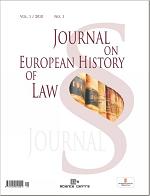ABGB und das kanonische Eherecht
ABGBand the canonical marriage law
Author(s): Stanislav PřibylSubject(s): Law, Constitution, Jurisprudence
Published by: Evropská společnost pro právní dějiny, z.s.
Keywords: Austrian General civil code (ABGB); canonical matrimonial law; Catholic Church
Summary/Abstract: Unlike the Napoleon Civil Code of 1804 which established obligatory civil marriage for all citizens, the Austrian legislature chose confessional principle of matrimony. Different norms were applicable to three parts of population: Christian catholic, Christian non-catholic and Jewish. From the canon law of the Catholic Church the Civil Code adopted the impediment to marriage due to priestly ordination and monastic wows. It also recognized the impediment owing to indissolubility of matrimony as conceived by the Catholic Church. Model permitting people of various confessions to marry according their specific religious rules was later supplemented by an alternative civil marriage in case that the engaged couple would not meet the requirements imposed upon them by the canon law. Since 1870 the civil marriage was made possible between people without religion. By a special law of 1912 the civil marriage was made mandatory to citizens of Islamic faith.
Journal: Journal on European History of Law
- Issue Year: 2/2011
- Issue No: 2
- Page Range: 169-174
- Page Count: 5
- Language: German

